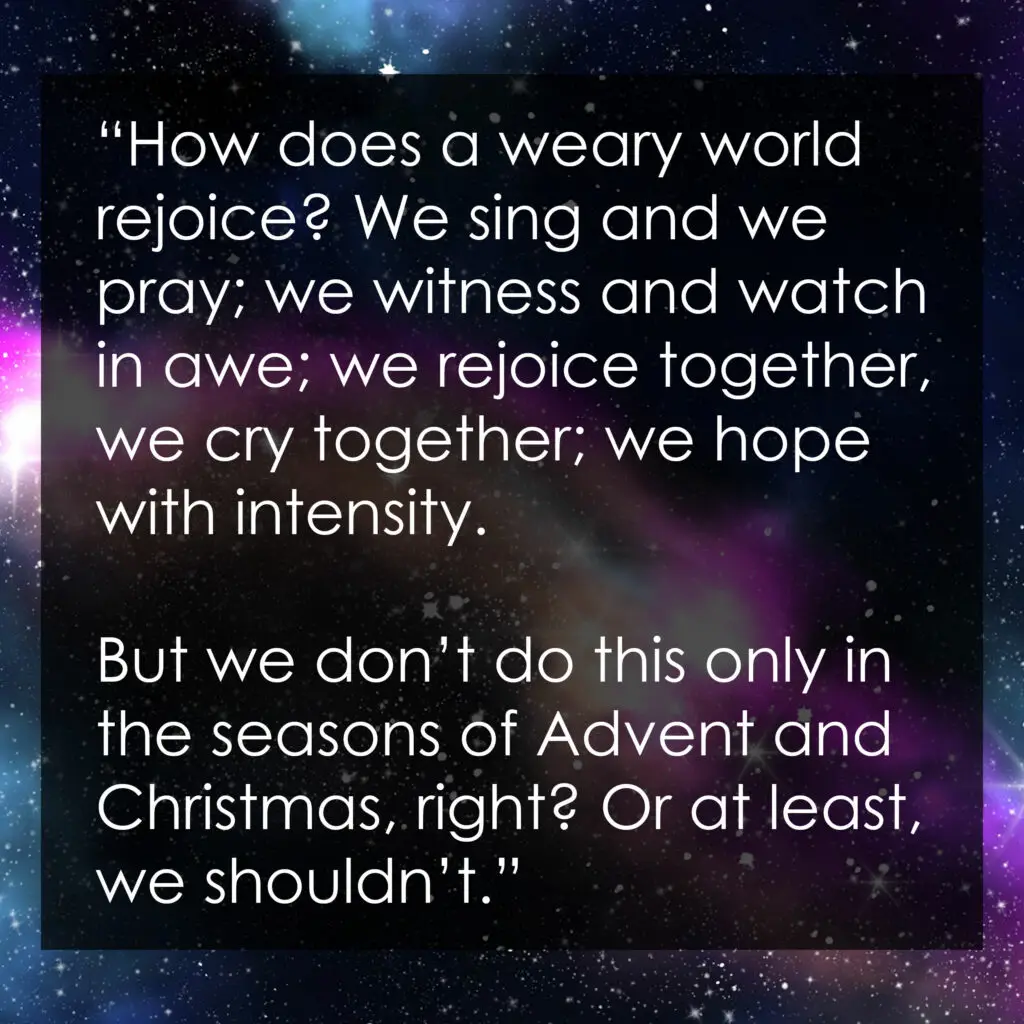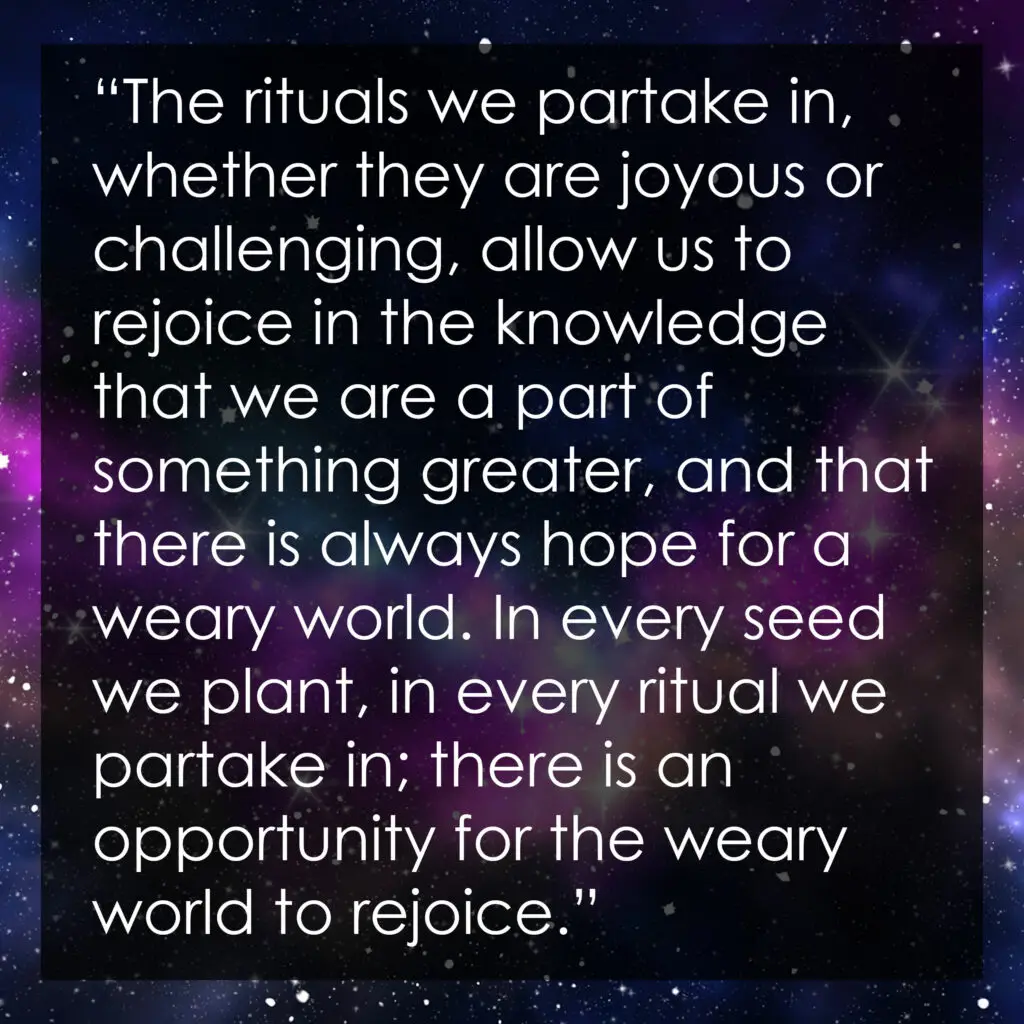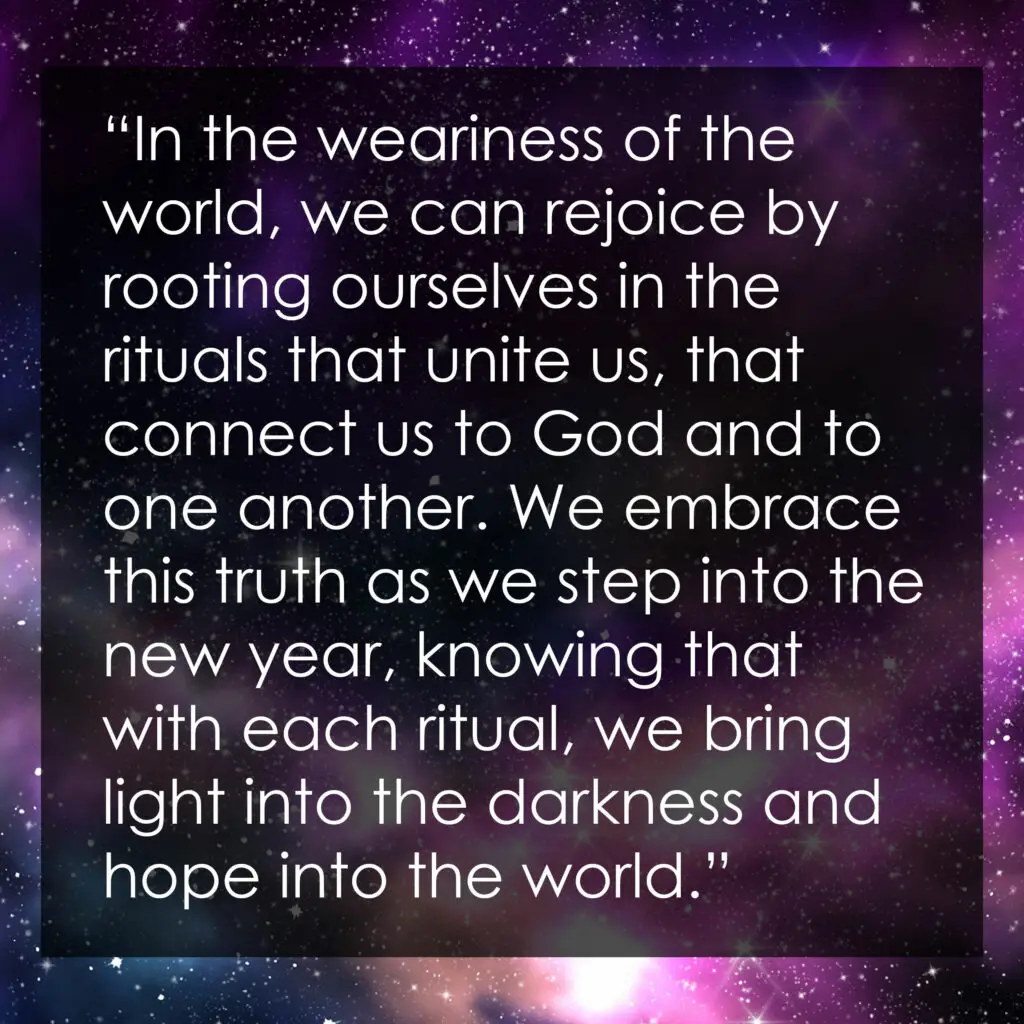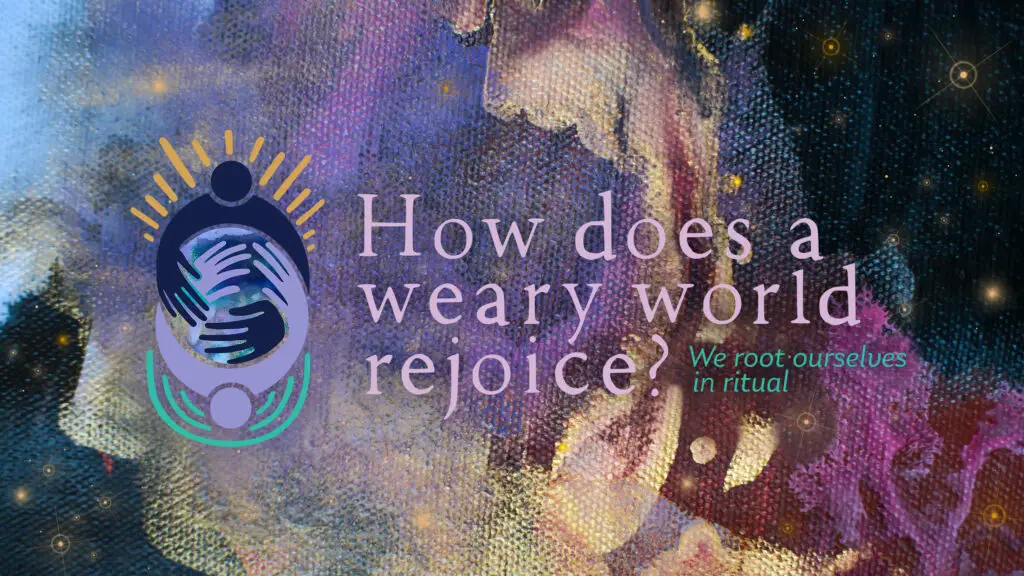
Merry Christmas! And Happy New Year! It has been just 7 days from when we gathered by candlelight to celebrate the birth of Christ, God’s Son, our Savior. Throughout December, we’ve been making room to welcome Christ into our hearts but honoring all that are hearts are already carrying. Weariness or joy, amazement or hope – there is a space for all of it this Christmas. How does a weary world rejoice? We sing and we pray; we witness and watch in awe; we rejoice together, we cry together; we hope with intensity.
But we don’t do this only in the seasons of Advent and Christmas, right? Or at least, we shouldn’t.
Every Sunday we come to this place with our hearts full of joys and hurts to rejoice in a weary world. Every Sunday we come to make meaning of our lives and find strength for the journey. Every Sunday we come to worship with our siblings in Christ knowing we are not alone. Every Sunday we raise our voices in glory by singing familiar and beloved songs. Every Sunday we recite liturgy and prayers to give words to our hopes and fears. Every Sunday we come to hear God speak to us through Scripture and Word. Every Sunday we are making room for Christ to be known in our lives so that we can make Christ known in the lives of others. Every Sunday we are rooting ourselves in rituals because rituals can provide order and meaning in a weary world that often feels beyond our control.
In our scripture reading today, we find a young family at the heart of a weary world narrative. Here, Mary and Joseph are new parents to the Christ child, journeying into the unknown of parenthood.
Eight days after the birth of Jesus, Mary and Joseph circumcise their child and give him the name Jesus, as was commanded to them. They return to the temple in Jerusalem to enact the sacred birth rituals of their culture and tradition. In the midst of their observance, the unexpected occurs. A man named Simeon, guided by the Spirit, enters the temple to proclaim Jesus as the “light of revelation.” Following him, a prophet named Anna approaches, praising God and speaking about Jesus to everyone longing for redemption.
In this story, we see the power of ritual in marking a sacred turning point. Even though Mary and Joseph might have been weary of what lay ahead, these sacred rituals and those who bore witness to them offered encouragement and strength for their journey.
But what do these ancient rituals mean for a 21st-century congregation? Well, rituals are not confined to the pages of scripture or the walls of ancient temples. They live with us in our daily routines, in our shared celebrations, and in the ways we grieve. Rituals provide structure to celebrations, losses, and transitions. Rituals bring meaning to our lives, especially when our futures seem deeply uncertain. They can help us make sense of confusing, ambiguous, daunting, or difficult chapters in our lives. While we might not always associate rituals with joy, perhaps we can find joy in the meaningful ways we choose to mark and celebrate our lives.
In 2014, The Reverend Cecelia D. Armstrong delivered the eulogy at her father’s funeral. She spoke of her father as a great giant. Rev. Armstrong described him as one of those guys who just helped wherever he was needed. However, he did not just come and do things for you. He would show you how to do it yourself because he did not want to return and do the same task again. He was the epitome of the saying, “Give a person a fish and they will eat for a day. Teach a person to fish and they will never go hungry.” Rev. Armstrong said her dad believed in planting seeds that would grow in the very people who would be here long after he passed away.
Rituals are one of the ways we plant seeds in our lives and in the lives of the generations to come.
Think about it. Even the experience of burying a seed in dirt, a seemingly weary task, can produce something beautiful in time. Even in the most challenging times, rituals can comfort us, guiding us through the dirt so to speak, and help us bloom. Our rituals have the power to bring joy even in times of great weariness. They provide comfort, solace, and a sense of belonging.
Right before Christmas, I asked on my Facebook page for church goers, both FPCA members and beyond, to share stories of attending church (or rooting themselves in ritual) following a significant life event. Consider the rituals in these stories.
A friend of mine from North Dakota shared a story about the strength and resilience of her congregation when we returned to their church after a devastating fire. The ‘new’ building stood as a powerful testament to their faith and their resolve, a symbol of their commitment to their rituals, and a beacon of hope in a weary time.
A member of this church shared a story of worshipping on All Saints Day after his father’s death. While remember ‘I Sing a Song of the Saints of God’ with tears streaming down his face he was given powerful reminder of father’s place in the great cloud of witnesses who have gone before us.” Despite his grief, he found solace in the rituals of our faith, in the hymns that reminded him of his father’s place among the saints.
Or consider the experience of a woman who returned to church after her father’s death. Growing up, she always sat between her parents at the church… and on that day following her father’s death, she said she could feel my dad sitting to her left, teasingly nudging me, which was our special way to say ’I’m glad you’re here with me’ To this day, she shared she still feels his presence to her left, and her Mom to her right. She felt the presence of her parents beside her, their rituals of sitting together in church bringing a sense of comfort and closeness. The rituals she shared with her parents continued to provide solace, even in their absence.
A couple from my previous congregation shared a story of returning to church after finding out they were expecting a child after years of battling infertility. The rituals of their faith gave them hope and patience during their struggles, and their return to church after receiving the good news was a joyful celebration of God’s faithfulness.
Friends of mine who I used to serve with in a church in New Jersey shared a story that following their wedding, they returned to their church. Despite the challenges they faced as a LGBTQ+ couple in other churches, they found acceptance and love in a worshipping community. The rituals of their church not only recognized their union but celebrated it with joy and love.
Another member shared, on 9/11 all she wanted was to be with her girls and be at church. The service brought hope and comfort as we all grieved together knowing that God grieved with us. She also shared another story about the joy of bringing each of her girls to church for the first time after they arrived. The wait for each was long and filled with pain and disappointment which made the joy of their arrival that much stronger. It was a holy experience to share her joy with the people and the God who had seen me through it all. Here, the ritual of community, brought comfort in following 9/11 and joy following the arrival of her daughters.
Finally, another member and friend shared her first time back in after her first child, a son, was born still. She remembers it coincided with Lent, and it felt comforting to find herself in a pew. She described that she never experienced a greater understanding or connection to the experience of sacrifice and loss together with the hope resurrection. She identified with Mary, Jesus’ mother, knowing she too lost her Son. It made it okay for her to just show up and weep.
These stories remind us of the power of rituals. Whether we are celebrating a new union, grieving a loss, or sharing the joy of a long-awaited blessing, our rituals ground us in our faith, connect us with our community, and give us a reason to rejoice.

The rituals we partake in, whether they are joyous or challenging, allow us to rejoice in the knowledge that we are a part of something greater, and that there is always hope for a weary world. In every seed we plant, in every ritual we partake in; there is an opportunity for the weary world to rejoice.
Tonight, we will bid farewell to this year and step into the unknown of a new year. As we reflect on the power of rooting ourselves in ritual, we must consider the significance of this moment. It is not a mere coincidence that we gather here on the first Sunday after Christmas, on the eve of a new year.
The rituals we embrace in our faith, the songs we sing, the prayers we offer, the community we find solace in, all serve as anchors in our lives. They ground us, providing stability and meaning amidst the uncertainties of the world. And as we stand on the threshold of a new year, these rituals become even more vital.
In this weary world, where chaos and change often reign, our rituals offer us a sense of continuity and purpose. They remind us of the values we hold dear, the love we have for one another, and the faith that sustains us. They guide us in setting our priorities for the year ahead.

As we embark on this new year, we must prioritize the rituals that ground us in our faith. Let us commit to regular participation in worship, to engaging in prayer and meditation, to nurturing the connections we have with our church community. These rituals will be the foundation upon which we build our lives in the coming year.
In the weariness of the world, we can rejoice by rooting ourselves in the rituals that unite us, that connect us to God and to one another. We embrace this truth as we step into the new year, knowing that with each ritual, we bring light into the darkness and hope into the world.
In the name of the Father, Son, and Holy Spirit. Amen.”

